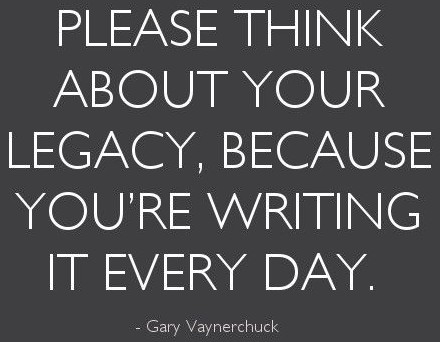Yesterday when archiving my inbox I came across emails from two dear friends who died a couple of years ago. One of them was a voice from my childhood that led to remembering long forgotten delights. Another a brusque email from a colleague whose warmth in real life was very different to her stilted presence online. I went to Facebook. There they were as though nothing had changed. Their legacy lives on.
This led me to further reflection. I was coaching a leader recently had lost his cool in a meeting (he felt bad about this). However his main concern was not this but that the event had been tweeted around the company minutes after. He was concerned for his reputation. Another coachee, known for her terse – to the point of rudeness – contribution to yammer, couldn’t understand why she had been asked to change her online style and tone. She argued that her face-to-face presence made up for it. Yet another CEO – I have heard this many times – has “no time” for online writing or tweeting, leaving it up to the communications department.
Too often I hear social media dismissed on the grounds of the inanity of the tweet or the absurdity of ‘6 ways to change your life’. Forgotten is that social media also has the power to revitalise writing skills (we could think of a tweet as a modern day Haiku, or a blog as the modern equivalent of the wonderful narratives of the famous nineteenth century letter writers).
Whether we like it or not, social media, in chronicling our endeavours throughout our careers, leaves a trace, a legacy that goes on well past our death.
I often ask my coachees, when you are no longer in the role and someone looks you up online, what do you want to be remembered for? Is it your technical expertise recorded in endless dry reports? (of great significance for perhaps a nanosecond!). Is it the vanilla ‘comms’ that the communications department write for you? Is it your grumpy replies to those endless emails and intranet queries?
The art of writing is not considered a crucial organisational skill. Most organisational writing is instrumental, tedious, dreary and devoid of humanness; reduced to the executive summary, a memo or the cost. We used to forgive the expert (mostly) for his [sic] mind-numbing writing. Now we also have access to experts online (mostly more up-to-date) and we are less forgiving. People want to see the person behind the expert just as people want to see the person behind the role of leader.
We could learn a tip or two from the nineteenth century letter writers. They approached writing as both an art and a skill, including in their letters valuable information and expertise as well as the intricacies of their lives. A website, www.socialmediatoday.com ranks CEO blogs on 5 factors. The highest rankings are those that blend insights with personal interests, information as well as personal reflection. Another research paper looks at commonalities across successful CEO blogs and found the same thing. https://www.american.edu/soc/communication/upload/Jenny-Wang-Capstone.pdf
Having a CEO (and other senior people) modelling humanity through writing and blogs seems to me a good thing. The leaders we love are those that take risks and show themselves as human (like us!) with strengths and foibles. Writing from the heart as well as the head may help to challenge the often-dehumanising practices of much organisational life. There’s something in it for the author as well. Our writing will live online in perpetuity. It is our legacy – a trace of our existence long after we are forgotten!

